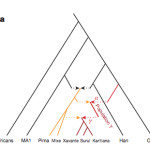
Amerindians Are Even More Genetically Diverse and Older Than You Thought
Science DOI: 10.1126/science.aab3884 Genomic evidence for the Pleistocene and recent population history of Native Americans Raghavan, Maanasa, Matthias Steinrücken, Kelley Harris, Stephan Schiffels, Simon Rasmussen, Michael DeGiorgio, Anders Albrechtsen, …Eske Willerslev. How and when the Americas were populated remains contentious….
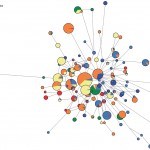
Y-DNA hg C3* in South America and Putative Ancient Transpacific Contacts
PLoS Genet 9(4): e1003460. doi:10.1371/journal.pgen.1003460 Continent-Wide Decoupling of Y-Chromosomal Genetic Variation from Language and Geography in Native South Americans Lutz Roewer, Michael Nothnagel, Leonor Gusmão, Veronica Gomes, Miguel González, Daniel Corach, Andrea Sala, Evguenia Alechine, Teresinha Palha, Ney Santos, Andrea…
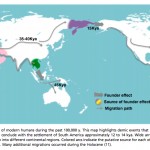
Out-of-Africa as Ghost Science
PNAS doi: 10.1073/pnas.1212380109 The Great Human Expansion Brenna M. Henn, Luca L. Cavalli-Sforza, and Marcus W. Feldman Genetic and paleoanthropological evidence is in accord that today’s human population is the result of a great demic (demographic and geographic) expansion that…
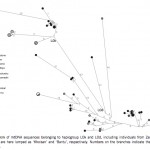
Intense Admixture: Khoisan Clicks and Khoisan Genes in Southeastern Bantu
European Journal of Human Genetics 2012, 1-7 DOI:10.1038/ejhg.2012.192 Genetic Perspectives on the Origin of Clicks in Bantu Languages from Southwestern Zambia Chiara Barbieri, Anne Butthof, Koen Bostoen, and Brigitte Pakendorf Some Bantu languages spoken in southwestern Zambia and neighboring regions…
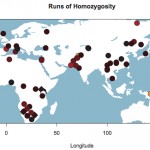
Clicks and Genes: Linguistic and Genetic Perspectives on Khoisan Prehistory
Science DOI: 10.1126/science.1227721 Genomic Variation in Seven Khoe-San Groups Reveals Adaptation and Complex African History Carina M. Schlebusch, Pontus Skoglund, Per Sjödin, Lucie M. Gattepaille, Dena Hernandez, Flora Jay, Sen Li, Michael De Jongh, Andrew Singleton, Michael G. B. Blum,…
Typological Linguistics and Population Genetics: A Synthesis or a Controversy
Trends in Cognitive Sciences Vol 16, Issue 3, March 2012, Pages 167–173 http://dx.doi.org/10.1016/j.tics.2012.01.007 Tools from Evolutionary Biology Shed New Light on the Diversification of Languages Stephen C. Levinson, and Russell D. Gray Computational methods have revolutionized evolutionary biology. In this paper…
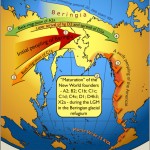
Dene-Yeniseian Language Family: Evidence for a Back-Migration to the Old World?
The 2012 Dene-Yeniseian Workshop took place on March 24 at the University of Alaska Fairbanks. Since the seminal presentation by the West Washington University linguist, Edward Vajda, of morphological and lexical evidence relating the small Yeniseian language family from Western…
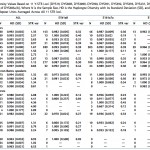
Genetics and Linguistics of the Bantu Expansion
Proc. Roy. Soc. Lond. B 279: 3256-3263. doi: 10.1098/rspb.2012.0318 Bringing Together Linguistic and Genetic Evidence to Test the Bantu Expansion De Filippo, Cesare, Koen Bostoen, Mark Stoneking, and Brigitte Pakendorf. The expansion of Bantu languages represents one of the most momentous…

Social Anthropology and the Bantu Expansion
Razib is now officially a fantasy science blogger. When he recently called his readers “stupid, ignorant or lazy” and put up a stringent comments policy (I bet inspired by my own) rallying them to show their “A-game,” I knew it…
A Seismic Shift in Human Origins Research, or a Downward Slide?
A new research paper is out which has created a lot of media buzz. “Evolutionary History and Adaptation from High-Coverage Whole-Genome Sequences of Diverse African Hunter-Gatherers, “ by Joseph Lachance et al. reports “archaic admixture” in three African hunter-gathering populations…
Out-of-Africa in the Mid-Pleistocene: A New Interdisciplinary Paradigm or a New Myth?
In the comments section on this blog, Dienekes raises the issue of interdisciplinary support for the out-of-America theory. Since I’m a big proponent of interdisciplinarity, the seeming convergence of genetics, archeology and paleobiology on the origin of modern humans in…

Howler Monkeys, Neandertals, Pygmies, Khoisans and More: Society for Molecular Biology and Evolution 2012
As I write, Society for Molecular Biology and Evolution (SMBE) is conducting its annual meetings in Dublin, Ireland. Dienekes has many useful pullouts from the available abstracts. I will make short comments on a few of them, plus bring in…
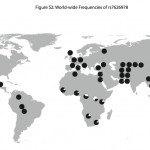
The Pygmy Enigma: Biology, Population Genetics and Linguistics
PLoS Genetics 8 (4): e1002641. doi:10.1371/journal.pgen.1002641 Patterns of Ancestry, Signatures of Natural Selection, and Genetic Association with Stature in Western African Pygmies Jarvis, Joseph P., Laura B. Scheinfeldt, Sameer Soi, Charla Lambert, Larsson Omberg, Bart Ferwerda, Alain Froment, Jean-Marie Bodo,…
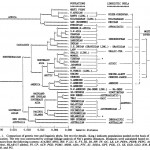
Phonemic Diversity and out-of-Africa Again: The Myth is Gaining a Momentum
PLoS ONE 7(4): e35289. doi:10.1371/journal.pone.0035289 Dating the Origin of Language Using Phonemic Diversity Perreault, Charles, and Sarah Mathew. Abstract Language is a key adaptation of our species, yet we do not know when it evolved. Here, we use data on…
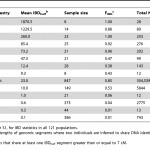
The Effect of Long-Term Endogamy on Identity-By-Descent
PLoS ONE 7(4): e34267. doi:10.1371/journal.pone.0034267 Cryptic Distant Relatives Are Common in Both Isolated and Cosmopolitan Genetic Samples Henn, Brenna M., Lawrence Hon, J. Michael Macpherson, Nick Eriksson, Serge Saxonov, Itsik Pe’er, Joanna L. Mountain. Although a few hundred single nucleotide…
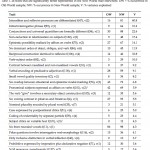
American Indian Uniqueness: Linguistics and Genetics
Journal of Linguistic Relationship 5 (2011): 130-134. Similarities among Languages of the Americas: An Exploration of the WALS Evidence Wichmann, Søren, Eric W. Holman, Dietrich Stauffer, and Cecil H. Brown. Abstract. An exploration of WALS (i.e. the World Atlas of…
Are American Indian Populations Subject to Sampling Bias in Human Origins Research?
The latest post by Dienekes re-kindled an observation that I wanted to make for a long time. Dienekes applied TreeMix software to ADMIXTURE components derived from HapMap-3 populations and created a tree with Sub-Saharan, East African, Northwest African, Gedrosia, Southwest…
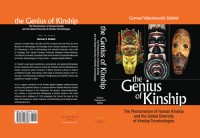
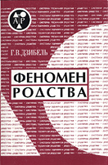
Recent Comments